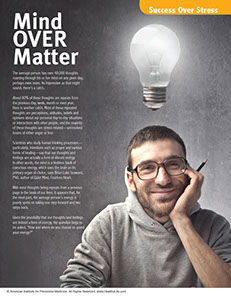SYMPTOM CHECKER
CONDITIONS
Male
Female
Child
Arm, Hand & Shoulder Concerns
Legs & Feet Concerns
Dental & Mouth Concerns
Ear & Nose
Eye Conditions
Head Conditions
Arm, Hand & Shoulder Concerns
Legs & Feet Concerns
Front
Back
Arm, Hand & Shoulder Concerns
Dental & Mouth Concerns
Ear & Nose
Eye Conditions
Head Conditions
Arm, Hand & Shoulder Concerns
Dental & Mouth Concerns
Ear & Nose
Eye Conditions
Head Conditions
Front
Back
Arm, Hand & Shoulder Concerns
Neck Links
Head & Neck Concerns
Arm, Hand & Shoulder Concerns
Neck Links
Head & Neck Concerns
Front
Back
Online Clinic
Wise Healthcare
Mind over matter

Print on Demand
The average person has over 40,000 thoughts roaming through his or her mind on any given day, perhaps even more. As impressive as that might sound, there’s a catch.
About 80% of these thoughts are repeats from the previous day, week, month or even year. Here is another catch. Most of these repeated thoughts are perceptions, attitudes, beliefs and opinions about our personal day-to-day situations or interactions with other people, and the majority of these thoughts are stress-related—unresolved issues of either anger or fear.
Scientists who study human thinking processes—particularly, intentions such as prayer and various forms of healing—say that our thoughts and feelings are actually a form of vibrant energy. In other words, the mind is a limitless bank of conscious energy, which uses the brain as its primary organ of choice, says Brian Luke Seaward, PhD, author of Quiet Mind, Fearless Heart.
With most thoughts being repeats from a previous page in the book of our lives, it appears that, for the most part, the average person’s energy is poorly spent on taking one step forward and two steps back.
Given the possibility that our thoughts and feelings are indeed a form of energy, the question begs to be asked, “How and where do you choose to spend your energy?”
This website is not meant to substitute for expert medical advice or treatment. Follow your doctor’s or health care provider’s advice if it differs from what is given in this guide.
The American Institute for Preventive Medicine (AIPM) is not responsible for the availability or content of external sites, nor does AIPM endorse them. Also, it is the responsibility of the user to examine the copyright and licensing restrictions of external pages and to secure all necessary permission.
The content on this website is proprietary. You may not modify, copy, reproduce, republish, upload, post, transmit, or distribute, in any manner, the material on the website without the written permission of AIPM.
2021 © American Institute for Preventive Medicine - All Rights Reserved. Disclaimer | www.HealthyLife.com















































